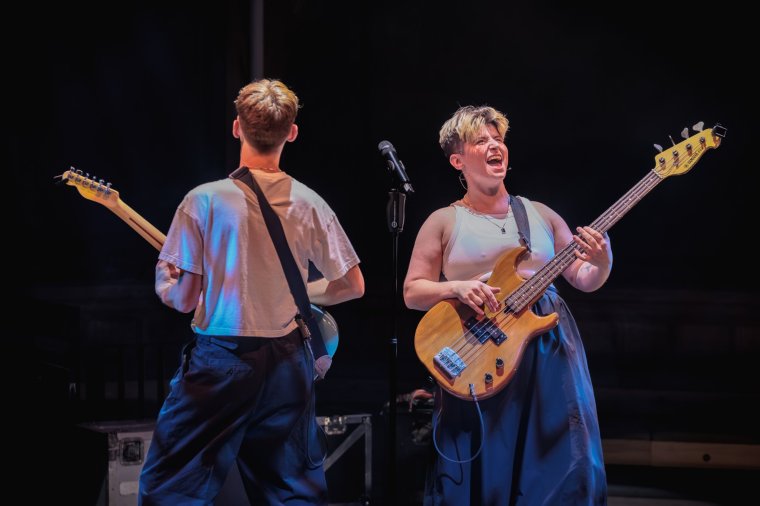Twelfth Night is Shakespeare’s most musical play. “If music be the food of love,” Orsino opines as he pines for the cloistered Olivia in its first scene, “play on.” From there, the references to music and song surface regularly throughout this tale of courtship, grief and mistaken identity.
There is a logic, therefore, to director Jimmy Fairhurst’s decision to situate this comedy within the modern music industry, although this novel staging, combined with a stripping back of Shakespeare’s dialogue, means it takes a few minutes to get to grips with both the concept and – for those like my companion who didn’t already know the play – the narrative.
The production gets into its stride once Viola (Georgia Frost), the shipwrecked twin of Sebastian – who she wrongly assumes has died in the same disaster – is established in Orsino’s household disguised as male servant Cesario. From here, the music industry conceit provides the excuse for a pop soundtrack, including some excellent vocal performances, notably a rendition of Shakespears Sister classic “Stay”, beautifully sung by Purvi Parmar’s Olivia as she falls in vain for Cesario.

It also facilitates the two standout performances of the night: Jack Brown as Olivia’s drunkard uncle Sir Toby Belch and Reuben Johnson as his gormless friend Sir Andrew Aguecheek. This pair of Elizabethan buffoons are recast as precisely the kind of Bullingdon-style twits that one can encounter in the creative industries, all “banter” in their pink shorts and gilets as they cavort with alcohol in the absence of anything more constructive to do. Rarely is Shakespearean comedy so genuinely funny.
This framing of Belch and Aguecheek also gives an additional edge to their bullying of Malvolio. Olivia’s pompous steward is played by Saturday night TV veteran Les Dennis – less widely known for his considerable stage career including with the RSC than for his short-lived stint on last year’s Strictly. His inclusion is a smart bit of casting, not only because he will doubtless pull in fresh audiences in line with company Not Too Tame’s mission to democratise theatre, but also because he plays his part with pathos and humour.
His peacock-like behaviour as a Scouser who has risen to status within the serving classes is cut through with the vulnerability of someone who finds himself in a world where he is patently older and more working-class than those around him, and his appearance in an ageing clubber’s version of yellow stockings as he seeks to woo Olivia is cringy in all the right ways.
The obligatory complex concluding scenes, in which everyone is confused for a while before Viola is revealed as a woman, the twins are reunited and new lovers couple up, are mercifully concise, Sebastian summarising the situation with a pithily un-Shakespearean “What the f**k is going on?”, before this raucous and unstuffy iteration of Twelfth Night wraps up as it was always going to: with more music.



Maurice Saatchi: I used to adore capitalism – then I had lunch with Margaret Thatcher